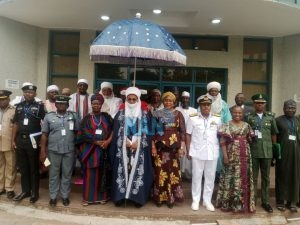The Etsu Nupe, Yahaya Abubakar, says Bida has become one of the best-selected city in the world by the UNESCO Creative Cities Network (UCCN).
It has also been designated as city of crafts and folk arts.
Abubakar said this in Abuja on Monday at a two-day National Workshop on the Implementation of UN Educational, Scientific and Cultural Organisation (UNESCO) 1954 Convention on the Protection of Cultural Property in the Event of Armed Conflicts.
The traditional ruler, who is also the Chairman, Council of Traditional Rulers in Niger State said, “Bida city became the first city in the country to be accepted as a member of UNESCO Creative Cities Network, and designated as city of crafts and fork arts.
“This was as a result of the protection of the Bida city’s cultural property which had survived several armed conflicts dating back from 11th century to date.
“The city traditional institution was able to maintain its respect of cultural property, by not exposing it to destruction or damage in the event of armed conflicts and hostility,’’ Etsu Nupe said.
According to him, the institution also safeguarded it from theft and vandalism.
“This was made possible by deploring traditional measures such as protection by traditional security system, community networking, knowledge and skills transfer, local practices and learning, storages, festivals and creativity.’’
The traditional ruler said that “universities that offer archaeology recently discovered that seamless glass bracelets technology developed thousands of years ago is still in practice in Bida.”
One of the resource person, Mr Nath Adediran, called on the Federal Government to allocate the statutory budget for the preservation, protection and security of cultural property in the event of armed conflicts.
Adediran, who called for the domestication of the protection of cultural property in the event of armed conflicts, stressed the need for relevant authorities in the education sector to incorporate in the school curriculum.
“Cultural property define people’s behavioral pattern in society’s ideals, traditions, arts, morals and beliefs, which gives humanity a national identity. Therefore, it is necessary to preserve our culture, history and heritage,’’ he said.
Also speaking, Mrs Ifeoma Anyanwutaku, the Permanent Secretary, Ministry of Information and Culture, said that the national workshop was to produce the strategic plan for the protection of cultural property in the event of armed conflicts.
She recalled that the convention for the protection of cultural property in the event of armed conflicts was adopted at the Hague, Netherlands, in 1954 in the wake of massive destruction cultural heritage during the second world war.
“Nigeria ratified the first Protocol of the 1954 Hague Convention on the protection of cultural property in the event of armed conflicts on June 5, 1961 and the second Protocol on October 21, 2015 and has since committed to the implementation of the instrument,” she said.



